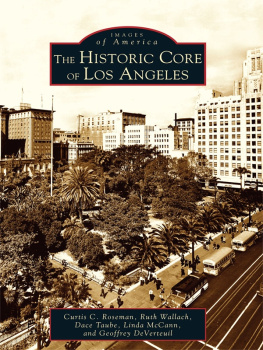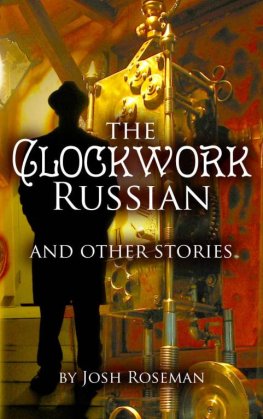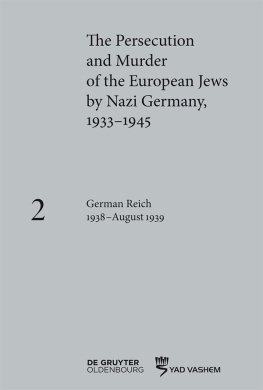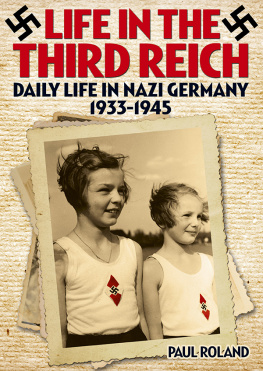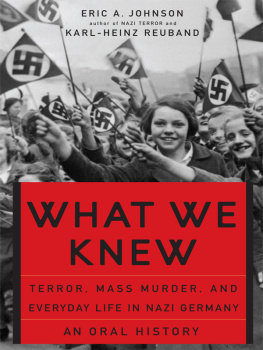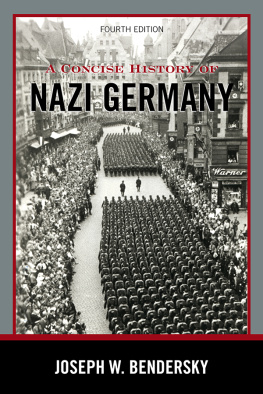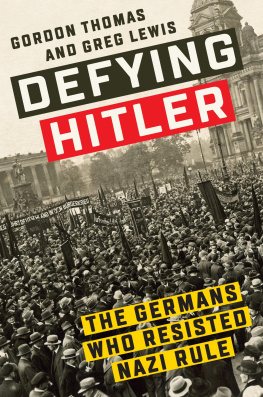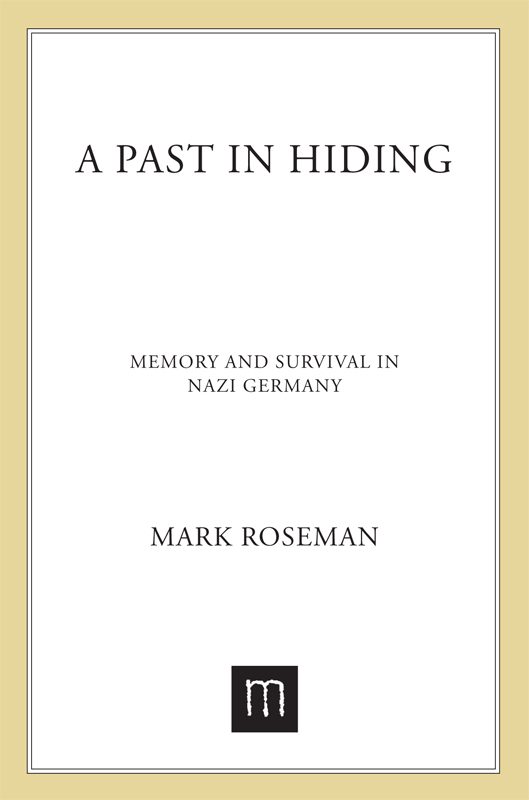
The author and publisher have provided this e-book to you for your personal use only. You may not make this e-book publicly available in any way. Copyright infringement is against the law. If you believe the copy of this e-book you are reading infringes on the authors copyright, please notify the publisher at: us.macmillanusa.com/piracy.
CONTENTS
To my parents
ABBREVIATIONS
ADStE | Gestapo Aussendienststelle (Gestapo Branch Office), Essen |
AfWGE | Amt fr Wiedergutmachung (Office of Restitution), Essen |
AS | Alfred Strauss |
ASE | Alte Synagoge, Essen |
BAB | Bundesarchiv, Berlin (Federal German Archive, Berlin) |
BDC | Berlin Document Center |
CH | Carl Hermann |
CV | Central-Verein deutscher Staatsbrger jdischen Glaubens (Central Association of German Citizens of the Jewish Persuasion) |
DB | Deutsche Bank |
DBE | Essen branch of the Deutsche Bank |
DBF | Deutsche Bank Historisches Zentrum (Historical Center of the Deutsche Bank), Frankfurt |
DRK | Deutsches Rotes Kreuz (German Red Cross) |
EK | Ernst Krombach |
EP | Ellenbogen Papers |
HStAD | Hauptstaatsarchiv, Dsseldorf |
JFB | Jdischer Frauenbund (Jewish Womens League) |
JPF-MH | Jdischer PfadfinderMakkabi Hazair (combined Jewish Scouts and Maccabi Hazair Youth Group) |
JSK | Jdisches Seminar fr Kindergrtnerinnen und Hortnerinnen (Jewish College for Kindergarten and Nursery School Teachers), Berlin |
KPD | German Communist Party |
KriPo | Kriminalpolizei (Criminal Police) |
LBINY | Leo Baeck Institute, New York |
LG | Landgericht (State Court) |
LGD | Landgericht, Dsseldorf |
LGE | Landgericht, Essen |
ME | Marianne Ellenbogen |
MS | Marianne Strauss |
NRW | North-Rhine Westphalia |
NSDAP | Nationalsozialistische Deutsche Arbeiterpartei (National Socialist German Workers PartyNazi Party) |
ODD | Oberfinanzprsident, Dsseldorf, Devisenstelle (Currency Section of the Finance Office, Dsseldorf) |
OFD | Oberfinanzprsident (Finance Office), Dsseldorf |
OKW | Oberkommando der Wehrmacht (Armed Forces High Command) |
OT | Organisation Todt |
RjF | Reichsbund jdischer Frontsoldaten (Reich Association of Jewish Combat Veterans) |
RSHA | Reichssicherheitshauptamt (Reich Security Main Office) |
RV | Reichsvertretung der deutschen Juden (Reich Association of German Jews), later Reichsvereinigung der Juden in Deutschland (Reich Association of Jews in Germany) |
RW | Ren Wolf |
SD | Sicherheitsdienst (SS Security Service) |
SStr | Siegfried Strauss |
StAE | Stadtarchiv (City Archives), Essen |
StAE NJ AJD | Stadtarchiv, Essen, Nachlass (Papers of) Jacobs, Artur Jacobs Diary |
StaPo | Staatspolizeileitstelle (Gestapo Main Office) |
StaPoD | Staatspolizeileitstelle, Dsseldorf |
StAW | Stadtarchiv, Wuppertal |
VE | Vivian Ellenbogen |
WGK | Wiedergutmachungskammer (court for restitution matters) |
YVJ | Yad Vashem, Jerusalem |
If any one faculty of our nature may be called more wonderful than the rest, I do think it is memory. There seems something more speakingly incomprehensible in the powers, the failures, the inequalities, of memory, than in any other of our intelligences. The memory is sometimes so retentive, so serviceable, so obedientat others, so bewildered and so weakand at others again so tyrannic, so beyond controul!We are to be sure a miracle every waybut our powers of recollecting and forgetting, do seem peculiarly past finding out.
Fanny in Jane Austen, Mansfield Park
INTRODUCTION
In a literal sense, Marianne Ellenbogen, ne Strauss, spent her past in hiding. A German Jew born in the 1920s, Marianne survived the Nazi killing machine by going underground. But her extraordinary story of survival had little of the passivity and isolation we associate with being hidden. Between 1941 and 1943, she and her parents were protected by contacts with the Nazi Wehrmachts own counterintelligence organization, the Abwehr. When Mariannes fianc was deported to a Polish ghetto, she managed for six months to maintain a unique chain of communication to him there. And when her own family was eventually deported, she went on the run. For two years, a hitherto virtually unknown resistance group helped her to survive in the heart of Nazi Germany. She surfaced in Dsseldorf at the end of the war, joined the Communist Party, and threw herself into rebuilding a better Germany.
In the months and years that followed, Mariannes past itself went into hiding. In 1946, she came to Britain, married, and tried to bury her memories. She led an ordinary life as housewife and mother until her death fifty years later. Even her closest relatives knew next to nothing about her wartime experiences. And yet the clues to that past had not quite disappeared. For more than half a century, an astonishing profusion of letters, diaries, official records, and memories lay dormant, ready to bear witness to Mariannes remarkable journey. The tale of how this evidence eventually came to life is no less extraordinary than the story of Mariannes survival.
This book is the search for a past in hiding.
* * *
In 1984, at the behest of her wartime helpers, Marianne Ellenbogen wrote one brief article about her underground life for an obscure journal, Das Mnster am Hellweg, published in Essen, the town of her birth. Titled Escape and Life Underground During the Nazi Years of Persecution, 19431945, the article began:
On a Monday morning at ten oclock in August 1943, the two most feared Gestapo officials in Essen appeared at our house. They gave us just two hours to get ready for transport to the East. At this point we were almost the last fully Jewish family left in Essen. In 1941, we had been condemned to deportation and assigned to a transport. But at the last minute, in full view of hundreds of people waiting for an unknown and frightening future, we were sent back by the Gestapo to our sealed-up house. Now, in 1943, this new deportation order came like a bolt from the blue.
The Gestapo men did not let us out of their sight. The allotted two hours were filled with feverish packing of the few things we were allowed to take with usclothing which, in the unknown destination of a work camp, should be practical, warm, and with luck keep us alive. Then came my moment. The two officials disappeared into the basement, probably to find some lootall the household goods we still possessed and did not need for day-to-day use were stored in the cellar in crates and cases. These helped to support the cellar roof and give us a bit more security from the bombing since, as Jews, we were not allowed to use the public air-raid shelters. Unable to say good-bye to my parents, my brother, and my relatives, I followed the impulse of the moment and ran out of the house just as I was, with a few hundred mark notes which my father had stuffed into my pockets moments before. I ran for my life, expecting to hear a pistol shot behind me at any minute. But to go in that way seemed to me a much better fate than the unimaginable one awaiting me in Auschwitz or odz, in Treblinka or Izbica. But there was no shot, no one running after me, no order, no shouting.


